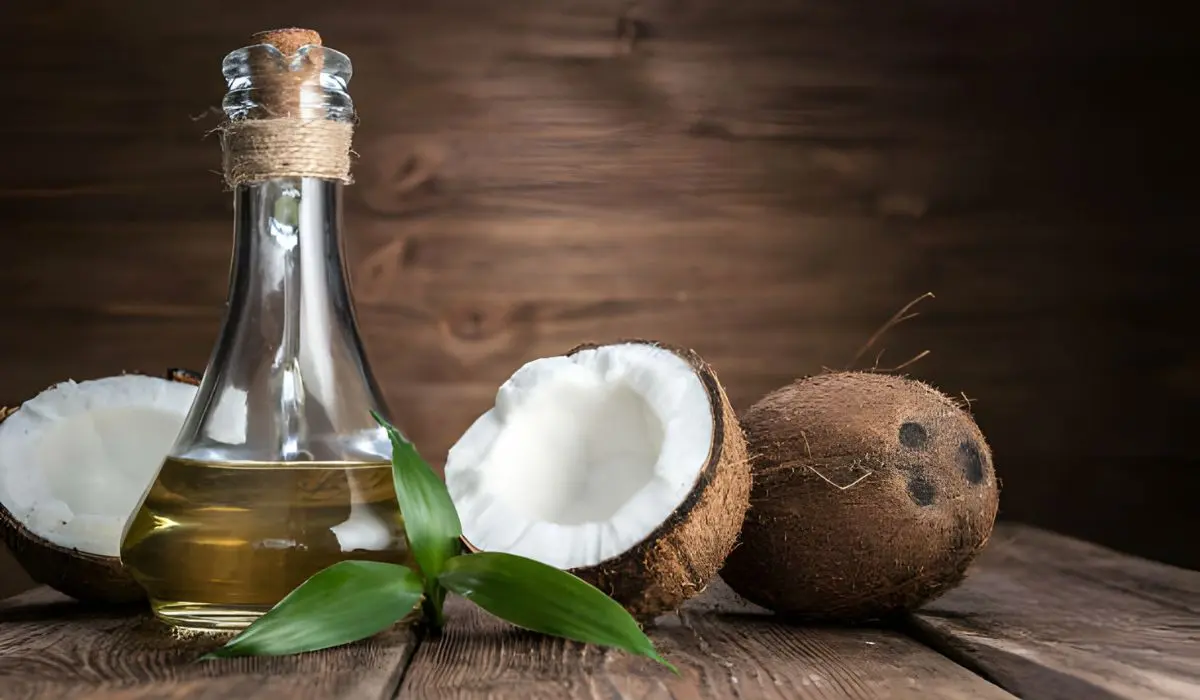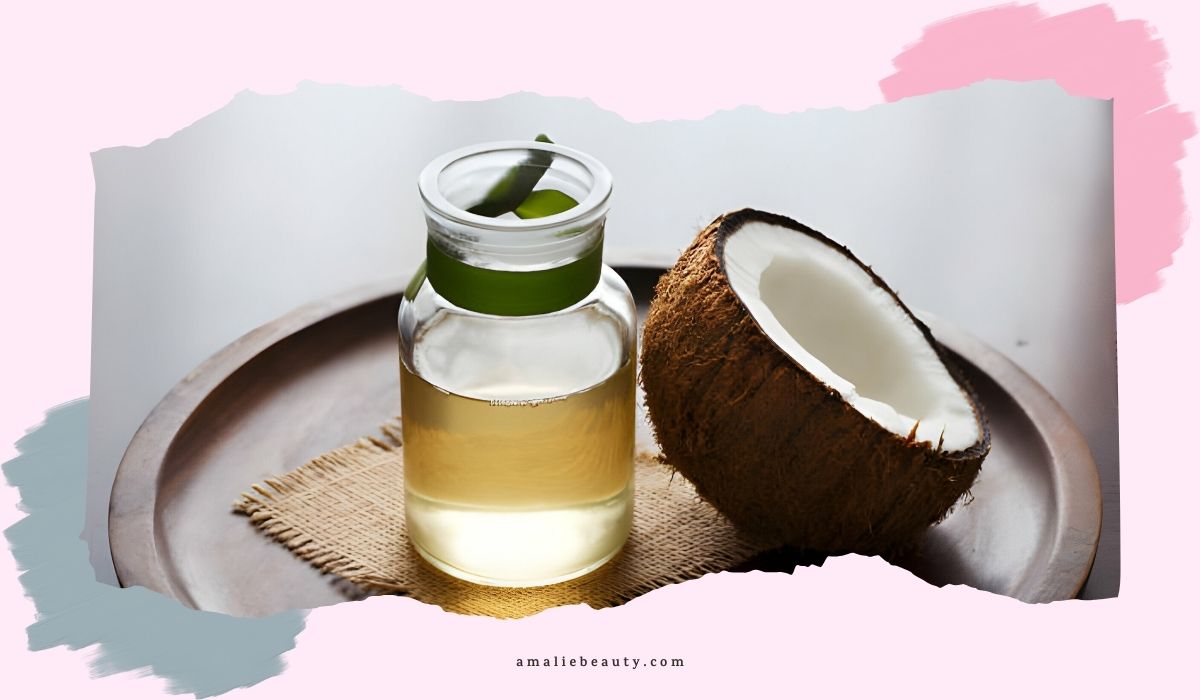Coconut oil has an incomparable reputation as a ‘magic’ key ingredient among wellness enthusiasts. It has its own diverse historical record. Ayurveda is an ancient way of being healthy, unlike modern health hacks, which are as old as Earth. This oil made a mark in every part of human society. Aside from being a staple in cooking and skincare, coconut oil is also revolutionizing dental health. This article explores the fascinating advantages of coconut oil, especially regarding dental health. It reveals how this natural marvel is a household favorite.
What Is Coconut Oil?

Coconut oil is a type of oil that comes from the inside of coconuts. It’s rich in a certain kind of fat that’s usually not found in plants.
Lauric acid is the main fat in coconut oil. This fat makes up about half of the oil. Coconut oil also has some other fats, but less.
One interesting thing about coconut oil is that its fats can fight bacteria. This is especially true for lauric acid. It’s good for keeping your mouth healthy. Long ago, people used coconut oil to clean their mouths and teeth. They did this by swishing the oil around in their mouth, a method known as “oil pulling.”
Coconut oil is easily available in most grocery stores or online. There are different types, but many people like using extra-virgin coconut oil because it tastes better and isn’t processed too much.
Benefits Of Coconut Oil
Coconut oil is very popular for its various advantages. It is especially popular for dental health. It is a natural moisturizer, making it ideal for skin and hair care. Its benefits also extend to oral hygiene. MCTs in coconut oil aid in moderate weight and boost vitality. This is why it is widely used in cooking and baking as a substitute for unhealthy fats.
Its role in dental care is noteworthy. It possesses antibacterial and antifungal properties. These properties are favorable for the oral cavity. Habits such as oil pulling with coconut oil may reduce the population of harmful mouth bacteria. These bacteria cause gum disease, tooth decay, and bad breath. Some people say it can naturally whiten teeth by removing surface stains.
What Is Oil Pulling And Its Benefits?
Oil pulling is a simple process where you swish oil in your mouth, similar to how you use mouthwash, but for a longer time.
Coconut oil is often utilized for oil pulling because it’s safe to eat and has health benefits. These include reducing swelling and getting rid of bad bacteria in the mouth. Since it’s edible, using it in your mouth is generally safe.
Most people who suggest oil pulling recommend using about one tablespoon of oil. You swish it around in your mouth for 10 to 15 minutes before spitting it out.
Oil pulling with coconut oil can bring several benefits to your mouth. It’s good for killing harmful bacteria, which can lead to tooth decay, bad breath, and gum disease. It’s a natural way to keep your mouth clean and a good alternative to mouthwashes.
Additionally, oil pulling can help with bad breath. It can also prevent cavities and improve the health of your gums. It reduces the bad bacteria and plaque that lead to cavities and gum problems. There’s no solid proof. Oil pulling might also help whiten your teeth by removing surface stains.
Potential Benefits of Teeth Whitening
- Reduction of Plaque and Bacteria: Coconut oil has antimicrobial lauric acid. It could indirectly whiten teeth by eliminating plaque and bacteria.
- Gentle on Teeth: Unlike chemical whiteners, coconut oil does not damage your enamel. This translates to improved protection against sensitivity and prevention of tooth damage.
- Improvement in Oral Health: Better-looking teeth may result from healthier gums and less plaque.
What Does The Science Say?
Although it has been reported that coconut oil could lighten teeth, scientific investigation is still lacking. Some researches indicate that oil pulling may reduce plaque and gingivitis, but solid connections to teeth whitening are lacking. Thus, though applying coconut oil over oral diseases may be beneficial, its whitening power on teeth remains unclear.
Comparison To Traditional Whitening Methods
In dental whitening, direct tooth color is altered using bleaching agents and whitening toothpaste. These techniques involve chemical action for the removal of superficial stains and discolorations. Alternatively, coconut oil functions more indirectly and subtly. The expectations of coconut oil as a teeth-whitening method should be reasonable.
How To Use Coconut Oil For Best Results
Oil pulling with coconut oil is a practice that’s been around for thousands of years. It originally started in India. It’s gaining popularity today as a natural way to improve oral hygiene. The idea is to use the oil much like a mouthwash, but there’s a bit more to it than that.
To start oil pulling, you’ll need a tablespoon of coconut oil. Place the oil in your mouth and swish it for 10 to 20 minutes. Moving the oil back and forth between your teeth is important as you do this. After you’re done swishing, spit the oil into a trash can. It could be better for your sink pipes as it can solidify and cause blockages. Once you’ve spat out the oil, brush your teeth as you normally would.
This process is effective because the fatty acids in the coconut oil latch onto the bacteria in your mouth. When you spit out the oil, you also eliminate these harmful bacteria and plaque. For the best results, do this routine before eating or drinking anything first thing in the morning.
Precautions
Although rather safe, coconut oil should not substitute for regular dentistry. It should also be noted that people cannot use oil pulling. People with certain health problems or those who find the procedure unpleasant must not undergo it. A dentist should be consulted before carrying out any new oral health measures.
Oral Hygiene Tips
Oil pulling with coconut oil can be excellent for your teeth. But don’t forget about regular brushing and flossing. You should brush your teeth two times a day with toothpaste that has fluoride in it. Remember to clean your tongue and the inside of your cheeks, too. You can use your toothbrush or a special tool for your tongue.
Also, drink lots of water every day. Try to eat less sugary stuff and don’t smoke. Eating a healthy diet is indispensable for keeping your mouth healthy. Going to the dentist often is also important for keeping your mouth healthy.
Coconut oil could be a natural, gentle alternative to traditional teeth whitening methods. However, its effectiveness as a teeth whitener remains debatable. While it may offer some benefits in oral hygiene, it’s not a guaranteed solution for a whiter smile. Incorporating it into your oral care routine could be beneficial, but traditional methods might be more effective for more dramatic results.

